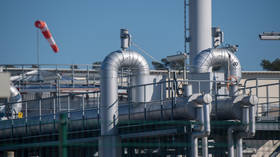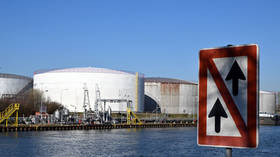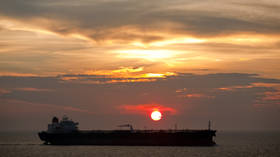Ending dependence on Russian energy will be ‘painful’ – Johnson

The British Prime Minister has called for a speedy end to “dependence” on Russian oil and gas, comparing it to “addiction,” in his guest piece for the Daily Telegraph published on Monday, warning that the process will be “tough” and “painful” for British households.
Abandoning Russia’s oil and gas supplies has become an imperative now, Johnson argued in his lengthy guest piece, as he called it a “terrible mistake” that the UK and other western nations had not stood up to Moscow’s “bullying” sooner.
He also implied Russia’s military action in Ukraine is to blame for the rising energy prices, saying that as Russia’s “bombs fall, the cost of oil and gas rises still further, meaning less money in your pocket.” And “that is why that dependence [on Russian oil and gas] must – and will – now end,” he has said, arguing that otherwise Russia will “exploit this dependence.”
British taxpayers should make no mistake believing this process would be easy, though, the prime minister warned, adding, “I don’t doubt that there will be tough times ahead. The process of weaning the world off Russian oil and gas, and hydrocarbons in general, will be difficult…We have to accept that such a move will be painful.”
Johnson argued that his government has been “spending billions of pounds to ease the cost of living and cut hundreds off your household bills. But none of us can afford to carry on like this for long.” He did not explain in detail what exactly the British households will have to face in the near future.
A solution suggested by the British prime minister includes heavier reliance on renewables, including offshore wind farms and solar power stations, which he has called “the quickest and cheapest route to greater energy independence.”
“A kilowatt from a North Sea wind turbine costs less than one produced by a power station running on gas shipped to the UK from overseas,” Johnson said. The second part of the strategy is turning to nuclear power by building “small modular reactors as well as the larger power stations” across the UK. Encouraging investments in oil and gas extraction from the UK’s North Sea reserves has been mentioned as well.
This strategy will eventually help the UK “cut the crippling bills being inflicted on homes and businesses across the country,” he has promised. Johnson’s words come as Western governments increasingly push for reneging on Russian oil and gas imports amid the ongoing military action in Ukraine. The US introduced a ban on purchases of Russian oil last week, and Australia joined the ban within days.
Other Western nations, however, were not so keen on the idea. Last week, German Chancellor Olaf Scholz admitted that his country cannot stop purchasing Russian gas immediately, since Germany’s energy supply “cannot be secured in any other way.” German Foreign Minister Annalena Baerbock also admitted that banning Russian energy would cause chaos and literally grind the nation to a halt.
The UK’s own energy giant – Shell – bought Russian crude after the military operation was launched in Ukraine. The company later apologized and vowed to donate the profits from the deal to a fund that helps Ukrainian refugees.
Elsewhere in the world, nations have been just as reluctant to join the US initiative. Indian Oil Corporation (IOC), the country’s biggest refiner, bought three million barrels of Russian oil on Monday for delivery in May, according to Reuters.
Western nations have imposed a set of unprecedented sanctions on Moscow over its military operation in Ukraine, but the nation’s oil and gas trade has not been sanctioned directly. Instead, the sanctions targeted Russia’s finances, banking sector as well as its space and aviation industry.















